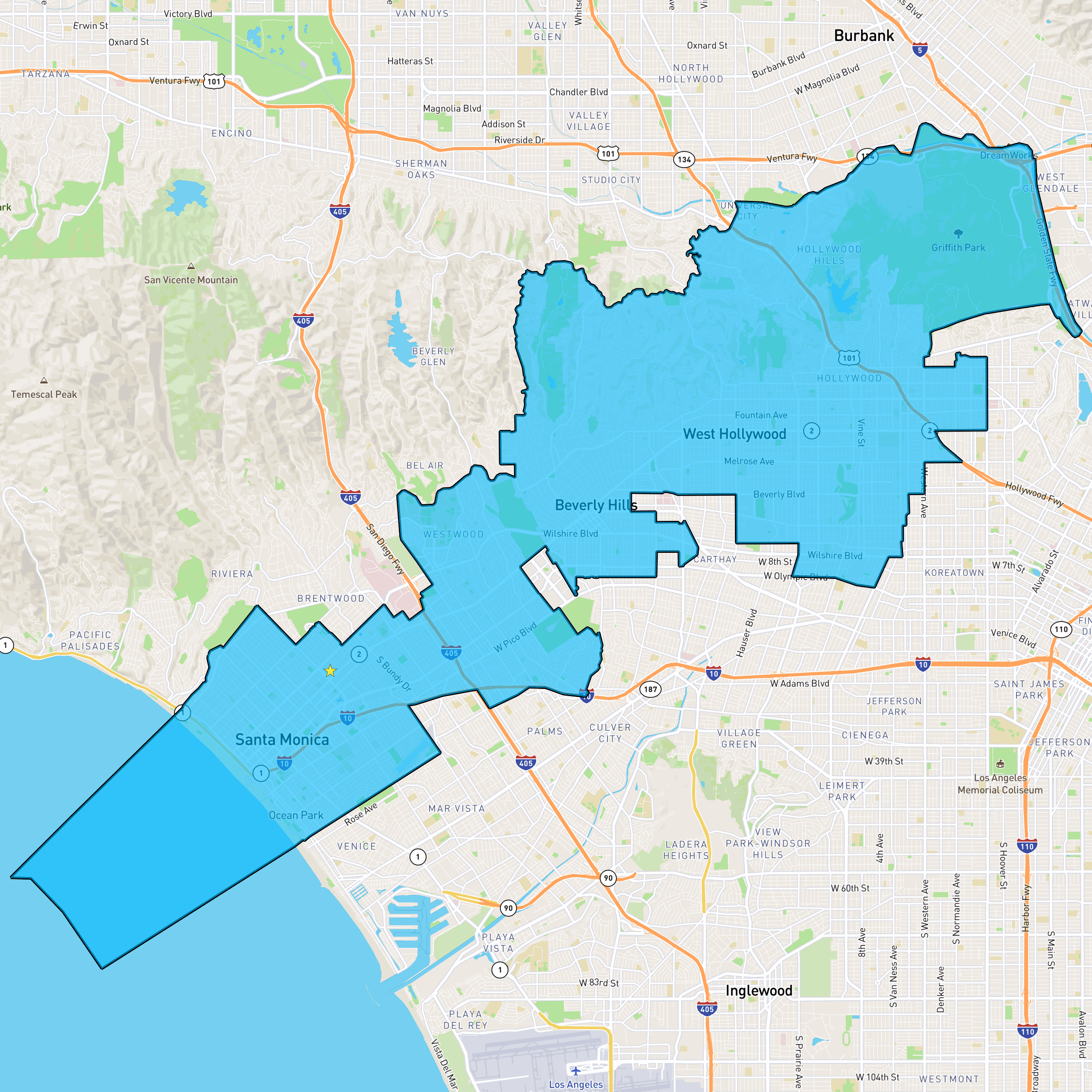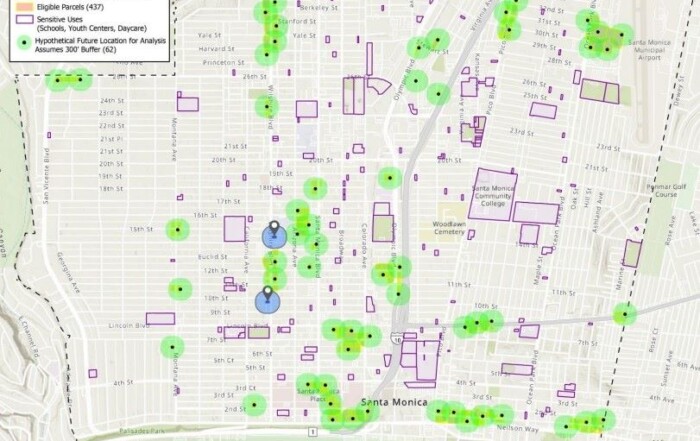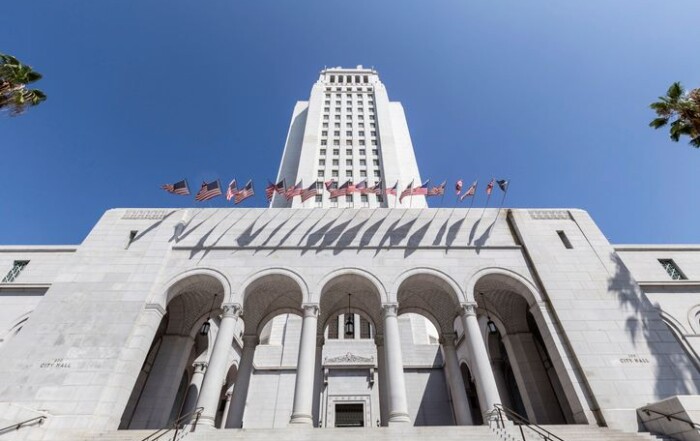When voters in one densely populated sliver of the Westside vote in the November 8 election, they’ll have two Democrats to choose from in the State Assembly’s 51st District. The newly drawn district, most of which is currently represented by outgoing Assemblymember Richard Bloom, includes Beverly Hills, Hollywood and the Hollywood Hills, Los Feliz, Santa Monica, West Hollywood, and Westwood Village. Their choices are literally A to Z with Louis Abramson and Rick Chavez Zbur emerging from the June 7 Primary.
Abramson, 35, is an astrophysicist and organizer who lives in Hollywood. In June, he received 33,300 votes – or 38.4 percent – finishing second to Zbur. He grew up in New Jersey, where, according to his campaign website, his parents raised him “To believe that our Jewish values require a commitment to building a better world.” He credits his grandfather, a veteran of the D-Day invasion at Omaha Beach, with teaching him to stand up for what he believes in.
Abramson became more concerned about issues around us all after the election of Donald Trump in 2016 and looked for ways he could get more involved. He had already served as an active door-to-door canvasser for the California Democratic Party, so he was used to hearing the concerns of his neighbors, who he says are worried about the high cost of living in the area and are compassionate about wanting to help those living on the street. He found one calling in running for the Central Hollywood Neighborhood Council, where he still serves.
Zbur, 65, is an attorney who most recently served as Executive Director of Equality California, which advocates for the LGBTQ+ community, for eight years. In June, he received 53,522 votes – or 61.6 percent. His route to running for the Assembly was built from a life of activism but was also deeply personal. He grew up in a small farming community south of Albuquerque, New Mexico. He didn’t envision the Harvard and Yale Law School futures that he would experience. His high school didn’t even offer the SAT. But he did so well on the Military Entrance exam as an alternative, he eventually was given an appointment to the U.S. Army Academy at West Point. It was then that Zbur realized he should avoid the appointment and go in a different direction. “I knew, in those days, I was a gay man, and that would not be a good thing given how LGBTQ people who handled in the military back in those days.”
While working for then-Congressman Tom Harkin and later in law school, Zbur continued to wrestle with his sexuality and place in the world. “When you think about it, it was a really different time. I mean, Sheila Kuehl hadn’t been elected yet. I wasn’t near California and that was a far distant thing, and I had just come to the conclusion that gay people didn’t have a place in public service because of discrimination. And so I decided I would come out to L.A. and practice environmental law.” That particular motivation was driven by the fact that his mother’s family suffered many losses and illnesses because of polluted groundwater.
But in September 2020, he lost his sister, Jacqueline Zbur, after a battle with ALS. “She didn’t pass away from COVID, but COVID definitely prevented her from getting the care she needed,” says Zbur. About nine months before her passing, Jacqueline turned to Zbur, and said, “You were meant to do something in public service, and you’re in your 60s now, and I have a lot of regrets over things I didn’t do in my life that I feel like I could have done, should have done, I wanted to do.” She added, “Rick, I don’t want you to look ahead 10, 15, 20 years from now and look back with regrets.”
Regarding his motivation for running, Abramson is clear. “I have just come to believe that California can do better than this,” he says. And he’s put that motivation to work. Abramson helped neighbors get COVID rental relief and also Ellis Act* money they were owed. He also led an effort to call thousands of seniors and deliver food to hundreds of them when COVID hit in 2019.
Abramson, who would be the only scientist in the state legislature, says, “When we’re facing a climate crisis, a housing crisis, and a homelessness crisis, I think we need people who don’t just believe in science, but people who understand it in our state legislature.”
HOUSING and HOMELESSNESS
“For the past many years, I have been focused on trying to help my community get out of the housing and homeless crisis that is obviously so impacting this entire state,” says Abramson. He tells me that one in 30 people in Hollywood is unhoused, and adds, “10 times as many people are in danger of joining them because they are paying at least half of their income in rent.”
He adds he would also make only the 4th renter out of our 120 state legislators.
Abramson says he supports Oakland Assemblymember Buffy Wicks’ Assembly Constitutional Amendment (ACA) 14, which would dedicate five percent of the state’s general fund over the next 10 years to housing and homeless solutions. Abramson also applauds the fact that an existing provision of the housing code, Article 34, may be removed by voters in 2024. Article 34 has previously made housing production difficult because it requires a ballot initiative in order to use government funds to support affordable housing production. Abramson also wants the state to reimagine land use policies that don’t deal strictly with funding. He thinks, for example, we should make it easier to build housing in job centers.
On homelessness, Abramson says all governing bodies have responsibilities in solving the problem but contends that, “The state has unique purchase and resources that need to be brought to bear more than they have been.” He adds of municipal bodies, “We’re struggling right now because city and county governments are beholden to imaginary lines. If you cross La Brea at Fountain where I live, L.A. City’s going to forget about you, you’re West Hollywood’s problem. The State can see past these imaginary lines.”
He favors affording an attorney to every renter facing eviction, and wants to start an insurance fund Californians can appeal to if they’ve faced an economic shock and need help making rent. In addition, he favors amending Costa-Hawkins** and the Ellis Act.
In addition to his housing work, Abramson is a founding board member of Hollywood4WRD. The organization is designated as the community liaison for a county mental health pilot program — Hollywood 2.0 — that has a $116 Million budget.
For his part, Zbur says, “I’m someone who believes we need to build more housing, but with a focus on affordable and workforce housing,” Adding, with regard to the higher numbers of housing units the state is requiring localities to build through 2029, “We’re not going to get to the numbers of affordable housing and workforce housing units unless the state does more to assist local jurisdictions to build this housing.” Zbur says he’s committed to looking for additional ways the state can assist, including making sure long-term funding streams for affordable housing are created. “It isn’t an unfair thing for local jurisdictions to have skin in the game on this,” added Zbur.
On the homeless crisis, Zbur wonders if the government is structured well enough to give communities the tools to address the issue. Given the regional nature of the problem, Zbur says most cities aren’t incentivized to do anything. He acknowledges that progressive cities that are compassionate and really try to help this community get services and supportive housing are also the ones attracting the largest homeless population because of their care. Says Zbur, “We need a regional strategy where we think about, ‘what’s the pipeline to get people into permanent housing?’ ‘Do we have enough interim housing with wrap-around services to address folks that actually have substance abuse and mental health services?’ and, ‘is it distributed fairly in our communities?’”
PUBLIC SAFETY
Zbur says, “I’m someone who believes we need to devote more resources to community safety.” He believes we need to fund law enforcement and sufficient levels to ensure quick response times, but also complement the police departments with wrap-around social service providers and unarmed response in places where force isn’t needed. He says money shouldn’t be taken away from law enforcement to hire these workers, but that we need to find additional funding for mental and other social welfare professionals.
“Police are a critical component of a functional public safety system,” says Abramson. As a member of the Central Hollywood Neighborhood Council, which houses the LAPD’s Hollywood Division, he says he talks to a lot of cops and works closely with them on a lot of issues. He emphasizes that it’s the responsibility of police officers to respond to crime, and believes we need to make it easier for them to do that rather than be called into mental health and other behavioral crisis where other professionals could better respond. Abramson also asserts this isn’t just an issue Democrats believe in. “I knocked on a Republican door, in a very wealthy part of the district, and he said to me if I push for mental health first responders, I have his vote and his family’s vote.”
THE CLIMATE CRISIS
Abramson doesn’t have a proposition yet on Proposition 30, which would tax wealthy Californians to fund electric vehicle charging infrastructure. However, he did point out that boosting electric vehicles is only fifth on the list of most effective things cities can do for the climate. He also added, interestingly, that brake dust is one of the worst pollutants cars create, and one from which electric vehicles aren’t exempt. But he has Tweeted that battery storage will be one of the key tenets of his climate policy.
He also favors a system of matching grants so systems like L.A. Metro can buy more trains and buses and get them on routes. He says people aren’t taking public transit because of wait times. “If you have to plan to take public transit, you’re not going to take it.”
Abramson says he’s excited to work with Assembly colleagues from rural districts to gain their understanding of water use and its impacts. “The central valley feeds our planet.” In his conversations with water experts, Abramson hears the most support for more groundwater capture and water recycling (toilet to tap). He admits water recycling doesn’t enjoy a great reputation, but argues, “It was good enough for Neil Armstrong. It’s good enough for NASA.” Abramson ultimately thinks we need to “double down” on water recycling and stormwater capture.
Mr. Zbur says, “We have to move to a clean energy economy and that’s getting off of, basically, all the dirty fossil fuels.” Zbur thinks the governor and legislature have been doing a good job of setting goals but wants to make sure the state now must figure out how to implement programs that help us get to the targets that have been set. “If we’re going to sell only electric vehicles in California by 2035, what are the interim steps that we have to put in all the electric charging stations we need throughout the state? We probably need one and a half million charging stations; we’re going to need a lot of fast charge stations, because a lot of folks that live in apartment buildings, or parts of our cities that don’t have a lot of single-family housing, they’re not going to have the luxury of charging overnight.” Zbur is in favor of Proposition 30.
To get off of our dirty fossil fuel resources, Zbur says we’re going to need offshore wind power, and says we’re already 10 years behind where we need to be. He expressed concern over the fact that most anticipated wind power development projects have essentially stopped moving forward. Wind blows at certain times and not at others, but is more consistent in offshore flows, making that position for wind most ideal. He also says we’re going to need a lot of distributed battery storage to help bolster our capacity during peak periods. He could see a battery in every home or building.
One of Zbur’s goals is also to ensure the green economy is manufactured here in California. He points out that the Salton Sea is a rich reservoir of lithium, which will be needed to make electric car batteries. He wants not only electric cars made here, but also electric buses, wind turbines, and storage batteries. “Our consumers will ultimately pay much of the cost of being the first to implement these technologies. And if we’re paying the cost of these, we should be getting the benefits in the form of high-wage, high-skilled jobs.”
EDUCATION
The winner of this contest will earn the right to represent UCLA and Santa Monica College.
Zbur’s concern with our higher education systems in the state is their uneven funding streams. He’s talked to advocates for UCLA’s interests and joins them in concerns over our “boom and bust” tax structure here in California, a state that may overly rely on the income tax over a greater mix. When times are good and capital gains are high, the money is there for our public colleges and universities. But when the economy is down, cuts to seemingly everything take place. Zbur is adamant about revisiting our entire tax structure to prevent these ebbs and flows.
He’s also committed to making college more affordable, saying, “I think we should be working towards a California where every California child has an ability to go to a California community college, state university, or UC free of charge.” He says the UC Board of Regents and the governor agree with that aim, and he feels a special responsibility for these issues given UCLA is located in Assembly District 51.
At the K-12 level, Zbur thinks we can best recruit and retain teachers by paying them more and treating them like the professionals that they are. He also says we need to find ways to better listen to teachers. He found it peculiar, for example, that teachers were asked to return to teach as frontline workers but weren’t sequenced into the early COVID vaccine rotation the way healthcare workers were.
When asked what he sees as the biggest issues facing our college systems in California, Abramson pointed to the cost of living for students “in this part of the world.” “Twenty percent of L.A. City College students are unhoused; 70 percent of UCLA graduate students are paying at least half their income in rent,” he said. He also wants the state to start investing in our college systems again, calling our divestment in them “sinful.”
To help recruit and retain teachers at the K-12 level, Abramson favors debt relief, more affordable housing options near the schools where they work, and treating the profession with the respect teachers deserve.
MAKING THE CASE
Dr. Abramson says he’s going to win the race because he’s going to “Talk to voters at their doors, on their screens, and in their mailboxes.” He points out that despite being outspent five-to-one in the primary, he was still pretty close to 40 percent of the vote. He credits his “fantastic” volunteer corps, which knocked on 17,000 doors this spring. He points to endorsements from Culver City Mayor Daniel Lee and Culver City Councilmember Alex Fisch, as well as Josh Kurpies, the District Office Director for the current Assemblymember, Richard Bloom. He also pointed to endorsements from Run for Something – an organization dedicated to “building the bench,” Abramson says, for future Democratic leaders – and “has the Gun Sense stamp of approval” from Moms Demand Action. He also boasts of support from other Neighborhood Councilmembers.
He says the role of a legislator can’t just be pointing out what is broken. “I think a legislator has to understand what they want something to be when it works.” His promise is that “I’ll work as hard as I did to understand the Cosmos to whip up votes I need to get our vision passed.”
Zbur says his priorities when he gets to the legislature will be the environment and energy policy, housing and homelessness, LGBTQ rights and the broader social justice agenda, and rebuilding our social safety net, noting, “Because I saw how inadequate it was for my sister.” Zbur also notes that, “This very well may be the most LGBTQ district in the state, although I don’t know that for a fact.”
Of the two, Zbur is way out ahead in the number of big-name endorsements from elected leaders, unions, environmental and other groups, including every state constitutional officer from Governor Gavin Newsom to Insurance Commissioner Ricardo Lara, 13 Members of the California Congressional delegation including Ted Lieu, Katie Porter, and Adam Schiff, the California Labor Federation, the California Democratic Party, California Environmental Voters (who’s Board he once chaired), the Sierra Club, and several elected councilmembers on the Los Angeles City Council and of other Westside cities.
“One of the reasons I think I got all of those endorsements isn’t because I’m important. It’s because I’ve been doing this work in the progressive movement in a whole host of ways. I know all of the progressive leaders because we’ve worked with them at Equality California or at California Environmental Voters. I’m also on the Planned Parenthood Board.”
Zbur says his eight years as Executive Director of Equality California is just one benchmark of a successful record in his career. He says he inherited the organization as it was nearing insolvency, and when he left, the organization had quadrupled in size to being the second largest LGBTQ organization in the country. Further, under his leadership, the organization shepherded through over 100 pieces of legislation, 15 or 20 of which Zbur says were first in the nation bills of their kind.
*The Ellis Act is the 1980s-era law that allows landlords to leave the rental business. In so doing, they are allowed to evict their entire building’s residents.
**Costa-Hawkins is a 1990s-era law that said, beginning January 1, 1999, that rent control jurisdictions had to allow for “vacancy decontrol.” This meant that if the tenants under original rent control move out, the unit jumps to the current market rate and is then re-controlled for the new tenants. The unit jumps to the new market rate with each tenant’s departure.
The Candidate’s Websites:
Louis Abramson – https://www.louisforca.com/
Rick Chavez Zbur – www.rickchavezzbur.com
Map Credit: California Redistricting Commission
Stay informed. Sign up for The Westside Voice Newsletter
By clicking submit, you agree to share your email address with Westside Voice. We do not sell or share your information with anyone.








